
Op-Ed: Delivering high-quality towage services in a competitive market
Written by
Credit: Svitzer
By Lise Demant, Managing Director, Svitzer Europe
The towage sector undoubtedly plays a critical role in the global supply chain. Without this essential service, larger vessels would be unable to berth and unberth safely in ports. This would impact the transfer of goods, as well as cruise services that generate more than $150 billion in economic activity every year. However, tug and towage operators currently face several geopolitical, technological and market trends and challenges, which are causing rapid changes in the sector.
Changes in trade patterns driven partly by war and partly by macroeconomic factors are reshaping the mix of vessels and the number of calls made at ports; digital technology is creating new ways for operators to manage and optimize their services and stay relevant; the global climate situation and pressure from stakeholders are forcing towage to reduce its environmental impact, all while staying highly competitive.
Dealing with these different factors and the rapid change within the sector impacts tug and towage service providers’ ability to deliver the best possible service to their customers. This will require providers to take a step back, reassess and ultimately change how they manage their operations, to ensure customers continue to get real value from the towage services they commission.
Locally, the necessary level of autonomy must be given to regional business units to make decisions that work best in the environment where they are the experts. From a more organizational standpoint, this will mean being able to understand and foresee where services are most needed by the customers and reallocate vessel and crew resources accordingly. Delivering this effectively will require new technology and new ways of working. In Europe, the Svitzer team has taken several initiatives to enhance operations and ensure customers receive a service that is tailored to their requirements.
In the UK, we have merged our UK North and UK South clusters into one unified team, to simplify operations and strengthen local empowerment, optimize our customer service, and manage the continued complexities in the region. We have also recently announced the purchase of a large tug to support terminal operations in Milford Haven, also in the UK. This will free up our Svitzer Ramsey tug to support London operations at the River Thames and River Medway, where we anticipate growth due to the current geopolitical climate. This will enable us to better cater to our current and future customer needs and is just one small example of how we continue to adjust our operations to meet customer demands.
The towage industry needs customer focused innovation that not only helps improve service delivery, but also tackles the existential challenges facing the sector. For example, reducing carbon emissions is both a very tangible strategic ambition for Svitzer and an increasing concern for Svitzer’s customers. At Svitzer, our decarbonization efforts span behavioral changes, equipment, and fuel, all to meet an ambitious target of 50% reduction by 2030 and net zero emissions in 2040. Decarbonization is also a key issue for towage operators from the perspective of bringing the sector in line with the wider shipping effort to decarbonize.
Last year, Svitzer launched its EcoTow product in the UK, allowing us to inset fossil-fueled towage for customers in our global network, both directly and indirectly. We have rolled out the EcoTow project across our entire fleet in London, Felixstowe, Southampton, and Scotland, with tugboats in these locations now all running on low-carbon biofuels. For customers that demand our services in ports where our tugs do not run on biofuel, we are able to calculate the total emissions impact of a customer’s global towage operations and match it with a volume of biofuel to be delivered to Svitzer’s biofuel-powered fleet in the UK.
It is critical that in an increasingly difficult market, affected by a series of geopolitical and technological changes, tug and towage operators do not compromise on the quality of their services. Ultimately, high-quality services that are on the forefront of customer demands will help operators stand out in a competitive and ever-changing sector.




